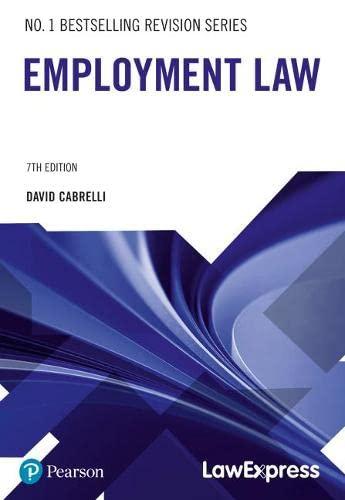Question
We should Provide alternative theories and don't just pick the most relevant theory to discuss.Answers should be sufficiently comprehensive. ESSAY 1: Scenario: Tom owned a
We should Provide alternative theories and don't just pick the most relevant theory to discuss.Answers should be sufficiently comprehensive.
ESSAY 1:
Scenario: Tom owned a house set on 1 acre of land that he wanted to sell when he retired in April, 2017. On April 1, 2016, Mary and Tom orally agreed that Mary would purchase Tom's house and 1 acre of land for $350,000 cash on April 15, 2017. In the meantime, Mary and Tom agreed that Tom would continue to own and live on the property. On April 15, 2017, Mary presented Tom with a cashier's check for $350,000 for the house and Tom transferred the deed to the house and land to Mary in her name. Mary and Tom properly filed all the documents necessary for the closing on the real estate sale.
Mary and Tom had also agreed previously that Tom could remain on the property following the closing of the sale on April 15, 2017 until April 17, 2017 to give him time to move out. On April 17, Tom refused to move out claiming that their oral agreement for sale of the property was invalid and unenforceable under the Statue of Frauds.
1. Was the sale originally subject to the Statute of Frauds and if so, for what reason(s) and why?
2. Is the contract for sale of the property valid so that Tom has to relinquish possession of the property? Why or why not?
ESSAY 2
Scenario: Eva owns Finest Enterprises, a clothing shop, as a sole proprietor. Eva wants to obtain additional capital to expand Finest, but she does not want to lose control of the business. Also, Eva has chosen not to take out any sort of loan to obtain additional capital to expand.
What is Eva's best option to obtain additional capital to expand and yet incur no further debt and retain control of the business? Why? Explore all possibilities and analyze why some may not be appropriate. For purposes of this question you should consider Eva forming a new business entity that may meet her business objectives.
ESSAY 3
Scenario:Brenda is purchasing agent for Commodities Corp. Dennis, a Commodities corporate officer, gave Brenda written authority to buy for Commodities Corporation as many computers and support devices as necessary. Dennis signed the written authority document. The next day, Dennis called Brenda and told her to buy only 50 notebook computers and nothing else.
Brenda went to E-Products, Inc. the next day, showed the written authority from Dennis to E-Products and entered into a written contract with E-Products to buy 60 notebook computers and a selection of printers and scanners to support the computers. E-Products promptly shipped the order to Commodities.
Dennis claims Commodities is not liable to E-Products for the sale because, Dennis claims Brenda exceeded her agency authority and thus was not acting as a Commodities agent in the purchase with E-Products.
A. Is Commodities liable to E-Products under the sales contract for the computers, printers and scanners? Why or why not?
B. Is Brenda personally liable to E-Products to pay for the computers, printers and scanners? Why or why not?
C. Is Brenda liable to Commodities for exceeding her agency authority and thus liable for paying Commodities for the purchases? Why or why not?
Step by Step Solution
There are 3 Steps involved in it
Step: 1

Get Instant Access to Expert-Tailored Solutions
See step-by-step solutions with expert insights and AI powered tools for academic success
Step: 2

Step: 3

Ace Your Homework with AI
Get the answers you need in no time with our AI-driven, step-by-step assistance
Get Started


